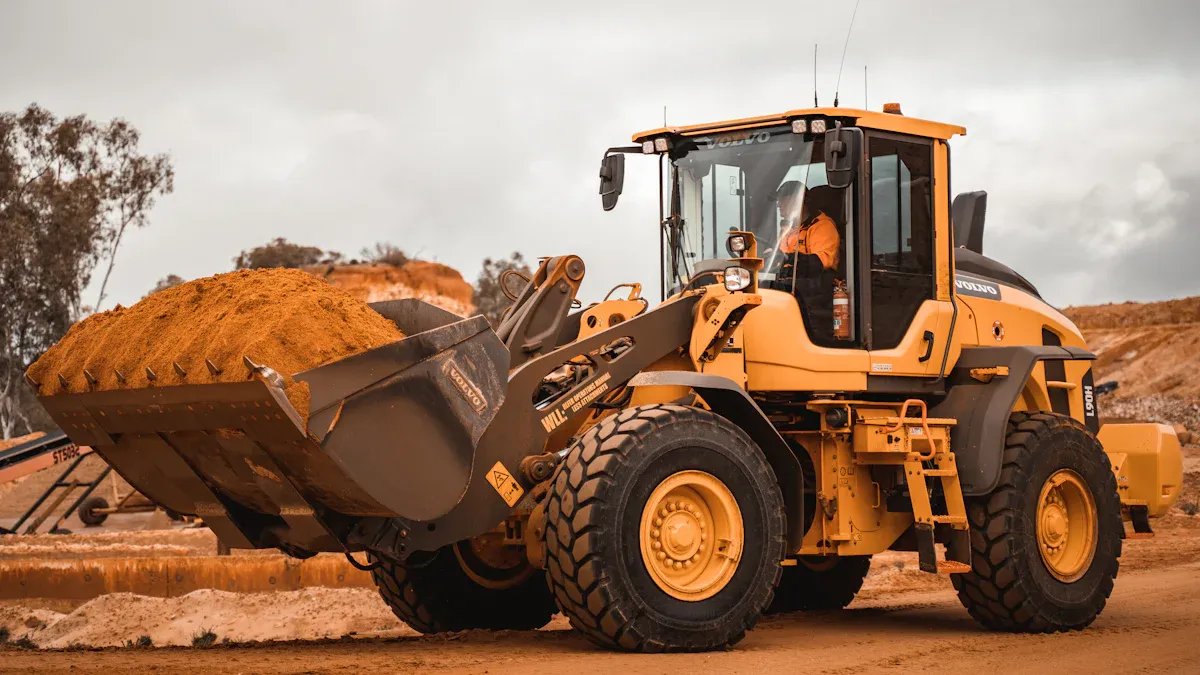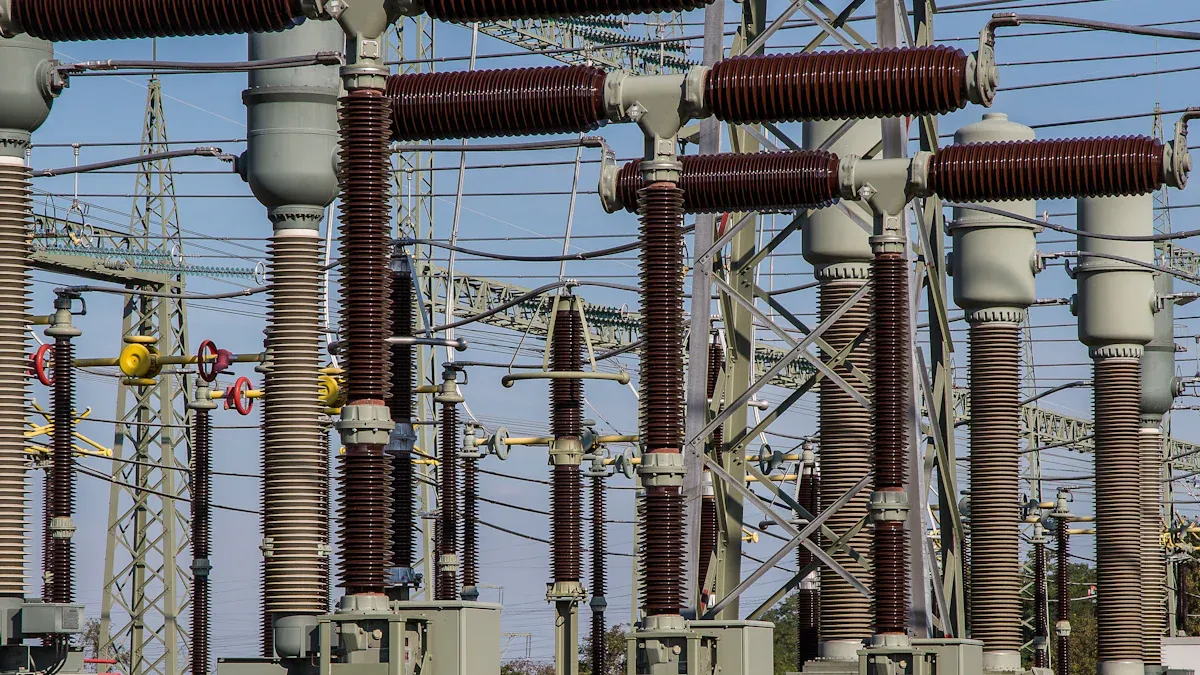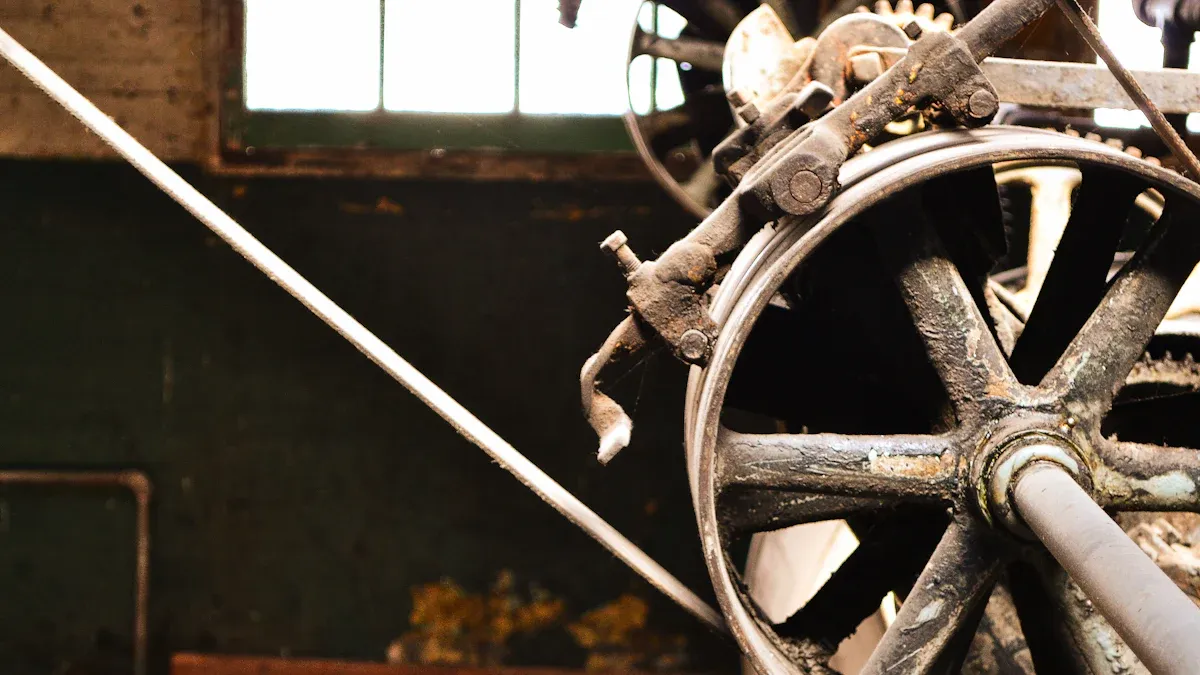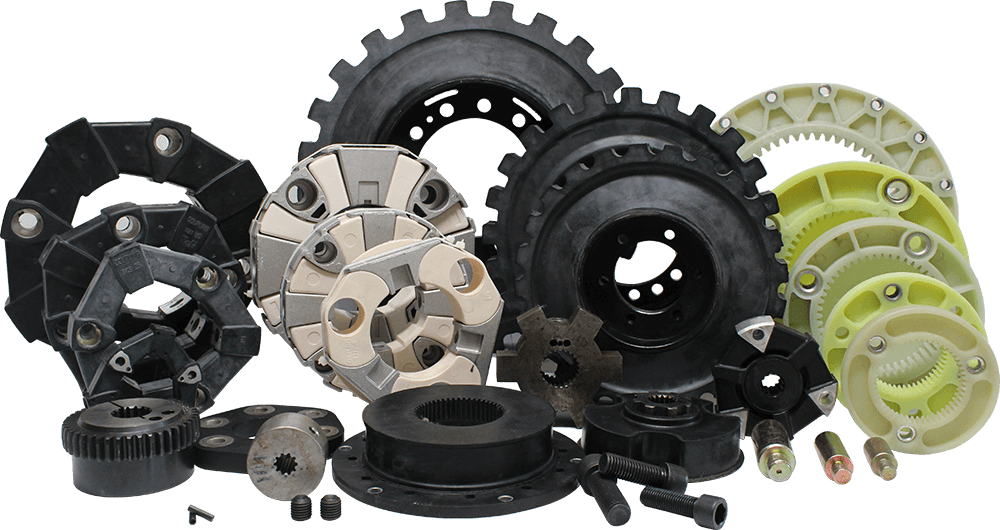
Synthetic rubber advantages are important in heavy machinery seal kits. You get seal kits that last a long time and do not break easily. Good rubber compounds help your machines work well. They lower wear and tear, so you pay less for repairs and use your machines longer. These materials can handle hot and cold temperatures and chemicals. This means your machines stop less often and you spend less on fixing them.
Key Takeaways
Synthetic rubber seal kits stay strong longer than other materials. This means you do not need to replace them often. You save money because of this. These seals work well in very hot or cold places. They also stand up to strong chemicals. This helps machines work well in hard jobs. Synthetic rubber bends easily. It makes a tight seal. This stops leaks even when machines move or shake. Using synthetic rubber lowers the cost to fix machines. It keeps machines from wearing out fast. This means machines stop working less often. Picking the right synthetic rubber seal kits helps machines work better and safer. This makes them a good choice for heavy machinery.
Synthetic Rubber Overview
Definition
Synthetic rubber is a stretchy material made from oil-based chemicals. Companies use things like styrene, butadiene, acrylonitrile, or neoprene to create it. Synthetic rubber is made to have special features that natural rubber might not have. It can handle strong chemicals and works well in very hot or cold places. It also lasts longer on the shelf before it goes bad. These things make synthetic rubber a good choice for seal kits in heavy machinery.
Handles strong chemicals
Works in hot or cold places
Lasts longer before going bad
Use in Seal Kits
Synthetic rubber is common in heavy machinery seal kits because it is tough. Seal kits stop oil, water, and dirt from getting into machine parts. Synthetic rubber does this job well. It stands up to chemicals, heat, and cold, and it does not wear out fast. There are different kinds of synthetic rubber in these kits. Each kind has its own good points.
Rubber Type | Key Properties | Applications |
|---|---|---|
Nitrile Rubber | Stays strong with oil and gasoline, great for hydrocarbons. | Oil and gas handling equipment |
Neoprene Rubber | Handles weather and pressure, slows down flames. | General industrial applications |
Silicone Rubber | Works well in very hot or cold places, resists the environment. | High-temperature sealing solutions |
EPDM Rubber | Handles weather, ozone, and chemicals, good for tough places. | Marine, Construction, Automotive |
Butyl Rubber | Absorbs shocks, keeps out water and gas. | General purpose applications |
Viton™ Rubber | Stays strong with heat, chemicals, and oil. | Automotive, aerospace, chemical processing, oil & gas |
When you pick synthetic rubber seal kits, you get many good things:
Toughness: These seals do not break with oil, chemicals, or heat.
Saves Money: You do not need to change them often, so you save money and time.
Works Everywhere: You can use them in many machines, like hydraulic systems or tools.
Chemical Strength: Types like nitrile and Viton keep working even with strong chemicals.
Fits Well: Synthetic rubber can fit many shapes, so you get a tight seal.
Synthetic rubber helps your machines work longer and safer. You fix your machines less and get more work done.
Synthetic Rubber Advantages
Durability
Seal kits need to last in tough places. Synthetic rubber lasts longer than many other materials. These seals do not break fast, even with oil or fuel. They also hold up when machines move a lot. In heavy machinery, you change seals less often. This means you can work more and fix less.
Synthetic rubber seal kits last longer than other seals.
They work well where oil resistance and saving money matter.
Using synthetic rubber helps machines run longer. It also lowers the chance of sudden problems. This keeps your equipment safe and working well.
Temperature Resistance
Heavy machinery works in very hot or cold places. Synthetic rubber does well in these conditions. It keeps its shape and strength in both heat and cold. Silicone rubber can handle very high heat.
Type of Rubber Seal | Minimum Temperature | Maximum Temperature |
|---|---|---|
General Rubber | -40°F | 150°F |
Silicone Rubber | N/A | 600°F |
Nitrile Rubber | N/A | 350°F |
EPDM | N/A | N/A |
Neoprene rubber stays bendy in many temperatures. SBR rubber works well when things get hot. You can trust synthetic rubber seal kits to keep working. They do not stop, even when weather or machine conditions change fast.
Chemical and Abrasion Resistance
Machines in construction, mining, and farming face tough chemicals and rough surfaces. Synthetic rubber stands up to oils, fuels, and fluids. It also resists damage from solvents. This makes it great for heavy machinery that uses these things every day.
Type of Rubber | Chemical Resistance | Abrasion Resistance | Flexibility |
|---|---|---|---|
Natural Rubber | Moderate | Good | Excellent |
Synthetic Rubber | Excellent | Excellent | Good |
Thermoplastic Elastomers | Limited | Good | Excellent |
Nitrile rubber resists petroleum and synthetic oils very well.
Synthetic rubber is tough and does not wear out fast.
These seals stand up to hydraulic fluids and solvents.
You get seals that last longer, even in dirty or rough places. This keeps machines safe and means you fix them less often.
Flexibility
Synthetic rubber is very flexible. This lets seals fit moving parts and stay tight. Flexibility helps when machinery shakes or moves. It is important for seals that need to move with the machine.
Property | Description |
|---|---|
Elasticity | Lets the seal move and bounce back after bending. |
Durability | Handles tough jobs and does not wear out quickly. |
Chemical Resistance | Stays strong when chemicals touch it. |
Compressibility | Keeps sealing power even under pressure. |
Surface Finish | Smooth surface lowers friction and helps the seal work better. |
Wear and Tear | Handles lots of movement without losing sealing power. |
Synthetic rubber’s elasticity makes a tight seal and stops leaks.
It keeps its shape and strength in tough places, so it lasts.
Oil, gas, and mining companies use these seals in heavy machinery.
You get seals that keep working, even when machines shake or move.
Cost-Effectiveness
Synthetic rubber helps you save money. Commodity rubber costs less because it is made in big amounts. Specialty rubber costs more but works better in hard jobs. Picking the right synthetic rubber can lower your project cost.
Taking care of rubber tracks helps them last longer and saves money.
Training machine operators helps stop damage and saves money.
Rubber tracks can cut ownership costs by about 25% in busy jobs.
Less time fixing machines means you save on repairs and work more.
Industry experts say synthetic rubber seal kits may cost more at first. But you save money over time. You fix machines less, they work better, and you spend less.
Tip: Choosing synthetic rubber seal kits helps your machines last longer and work better. This choice gives you more value from your equipment.
Material Comparison

Natural Rubber
Natural rubber comes from rubber trees. It feels soft and stretches easily. In seal kits for heavy machines, natural rubber bends well and is strong. It works best when it is not too hot or cold. It also does well in clean places. But natural rubber does not do well with oils or strong chemicals. If you use it in machines with lots of heat or chemicals, the seals can break fast.
Here is a simple chart to compare how natural and synthetic rubber work:
Performance Characteristic | Natural Rubber | Synthetic Rubber |
|---|---|---|
Hardness available (°Shore A) | 25-95 | 10-95 |
Temperature resistance (°C) | -40 to 80 | -70 to 180 |
Short-time peak temp (°C) | 100 | 100 to 350 |
Tensile Strength (N/mm2) | 25 | 8 to 30 |
Tensile elongation (%) | 800 | 150 to 800 |
Abrasion | Good | Moderate to excellent |
Flexibility | Excellent | Bad to excellent |
Resistance to wear/tear | Very good | Bad to excellent |
Resistance to oils and greases | Unsuitable | Unsuitable to excellent |
Natural rubber breaks down in nature, so it is better for the earth. If you want seals for easy jobs and care about pollution, natural rubber is a smart pick.
Thermoplastics
Thermoplastics like Thermoplastic Vulcanizate (TPV) are another choice for seal kits. These seals do not rust and slide easily. Thermoplastics work well when it is cold. They bend many times without breaking. But they do not work well if it gets hotter than 250°F. They also do not stand up to petroleum as well as rubber.
Material Type | Advantages | Disadvantages |
|---|---|---|
Thermoplastic Vulcanizate (TPV) | Great for gaskets and seals, bends well in cold, lasts long when bent | Not good for high heat (over 250°F), does not resist petroleum well |
Synthetic Rubber | Seals tightly, stretches well, works in many temperatures, resists chemicals | May not work as well in high-pressure jobs, not always good in very cold places |
Plastic seals are good for general jobs, especially when you need no rust and easy movement.
Rubber seals are best when you need tight sealing and stretching, especially in machines that move a lot.
Thermoplastics last a long time but do not break down quickly. This can hurt the earth.
Application Considerations
When you pick a seal kit material, think about these things:
What chemicals will touch the seals?
What temperatures will your machine face?
What is the place like where the seal will work?
Does the material match what your machine needs?
Synthetic rubber works well in hard jobs. It gives strong seals that stop leaks, even with tough chemicals or big changes in temperature. Synthetic rubber fits bumpy surfaces and handles shaking. You can choose the type that fits your job, so your machines work better and last longer.
Note: If you want seals that last, work in hard places, and keep machines safe, synthetic rubber is usually the best pick.
Real-World Applications

Construction Equipment
Synthetic rubber seal kits are used in many construction machines. Machines like excavators, bulldozers, and loaders need these seals. The seals help hydraulic systems work without leaking. Seal technology has gotten better over the years. Now, seals last longer and work well in hard jobs.
Material Type | Key Benefits |
|---|---|
PTFE | Good for fast-moving parts; lowers rubbing |
Polyurethane | Very strong; does not get pushed out easily |
FKM (Fluorocarbon) | Handles heat and tough liquids |
NBR (Nitrile) | Stays bendy and works in many places |
Modern seal kits have special shapes to stop leaks. Some seals use springs to stay tight when pressure changes. Special coatings help the seals slide and last longer. These new features help machines work more and break less.
Note: Using better synthetic rubber kits makes construction machines stronger, even in rough places.
Mining and Agriculture
Mining and farm machines deal with dirt, water, and chemicals a lot. Synthetic rubber seal kits keep these machines safe from leaks and harm. You find these seals in harvesters, tractors, and mining crushers.
Rubber parts for harvest machines
Seals that stop leaks in hydraulic parts
Pieces that keep out dust and water
Rubber Products | Applications |
|---|---|
Rubber gaskets | Sealing machine parts |
Rubber seals and tubing | Stopping leaks |
O-rings | Sealing and stopping leaks |
Crusher cones | Used in mining machines |
Feed plates | Used in mining machines |
Switching to synthetic rubber seals gives better safety from dirt and water. These seals also work well with high pressure and changing temperatures. They help machines stay safe and keep running.
Maintenance Impact
Using good synthetic rubber seal kits can save you money on repairs. You stop leaks and keep machines working right. Good seals block dirt and keep oil inside. This means you fix machines less and work more.
Good seals lower damage and wear.
They block dirt and keep oil in place.
You wait longer before needing repairs.
If you want your machines to work better, pick a trusted supplier. YNF Rubber has synthetic rubber seal kits that help machines last longer and work well.
When you pick synthetic rubber for seal kits, you get many benefits. These seal kits last longer and do not break from heat or chemicals. You also spend less money fixing your machines. These things help your machines work well and stay safe. If you want your machines to last, ask experts or look at YNF Rubber’s products. This helps your equipment run longer and saves you money.
FAQ
What makes synthetic rubber better for heavy machinery seal kits?
Synthetic rubber lasts longer and resists oil, heat, and chemicals. You get seals that work well in tough jobs. This means less downtime for your machines.
Can synthetic rubber seals handle extreme temperatures?
Yes, synthetic rubber seals work in both hot and cold conditions. For example, silicone rubber can handle very high heat. You can trust these seals in many climates.
How often should you replace synthetic rubber seal kits?
You do not need to replace them often. Synthetic rubber seals last longer than many other types. Always check your equipment manual for the best schedule.
Are synthetic rubber seal kits cost-effective?
Yes, you save money over time. These seals last longer and need fewer repairs. You spend less on maintenance and keep your machines running.
Where can you buy quality synthetic rubber seal kits?
You can get reliable synthetic rubber seal kits from YNF Rubber. They offer products that help your machines last longer and work better.









